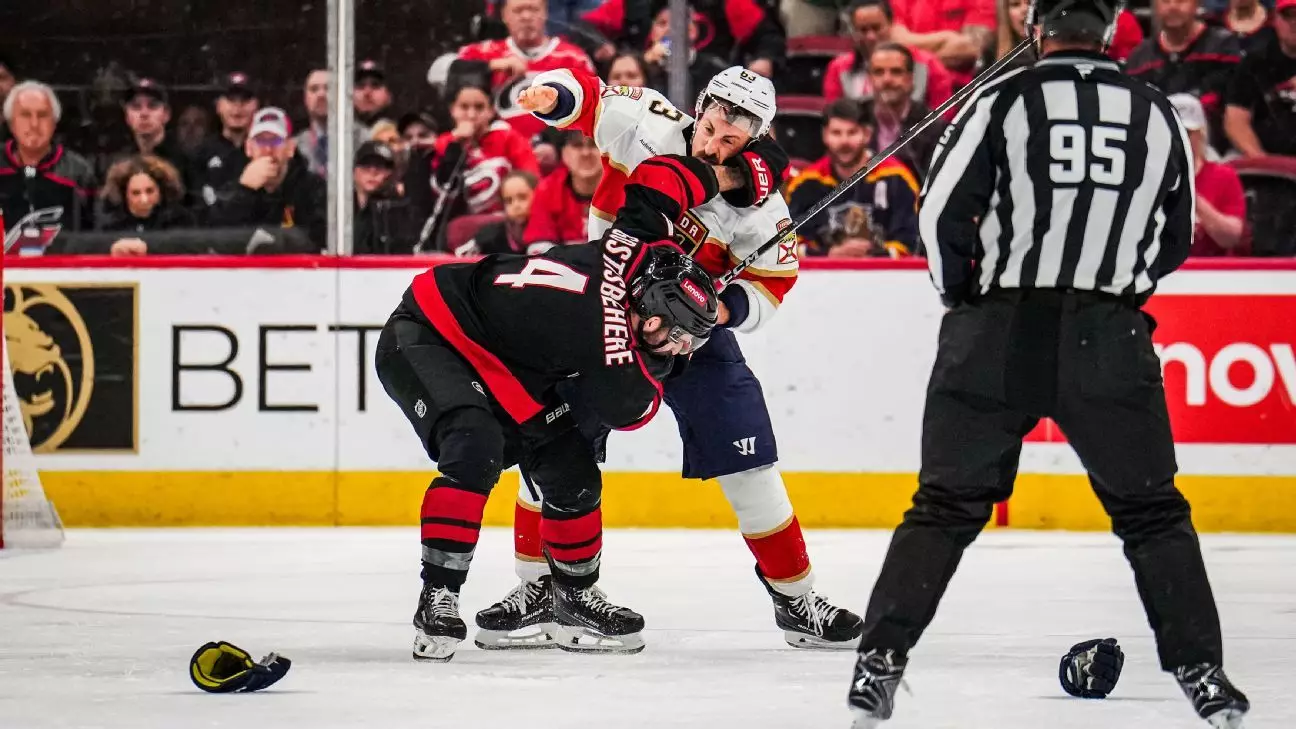In the world of playoff hockey, the line between aggression and strategy is razor-thin. The Carolina Hurricanes face this profound challenge as they prepare for Game 2 of the Eastern Conference finals against the Florida Panthers. Following a disappointing 5-2 loss in the series opener, head coach Rod Brind’Amour emphasized the necessity for his players to adopt a more disciplined approach in the face of Florida’s notorious penchant for provocation. As Brind’Amour astutely pointed out, it’s imperative not to allow the emotional turbulence to detract from their gameplay focus.
The Hurricanes have demonstrated resilience throughout this playoff journey, yet the need to internalize Brind’Amour’s message of emotional control and strategic play cannot be overstated. The team finds itself at a crossroads where the pressure of retaliation can either serve as a catalyst for motivation or a detriment that hampers their performance.
Critical Moments and Their Implications
In Game 1, a decisive turning point arose when center Sebastian Aho took a roughing penalty against the Panthers’ Anton Lundell. This misstep not only negated a Carolina power play but directly contributed to the Panthers scoring first, setting the tone for the remainder of the match. Aho’s emotional reaction, although understandable given the physicality of playoff hockey, underscores a critical thematic conflict: the need for the Hurricanes to maintain composure amidst provocation.
Brind’Amour’s frustration is evident as he lamented the circumstances surrounding penalties. Despite acknowledging that refereeing decisions can be contentious, he underscored an undeniable truth—retaliation penalties can undermine their chances of securing victory. As any seasoned player or coach will tell you, it isn’t just about securing a lead; it’s about managing the emotional highs and lows throughout the game.
Adjusting the Mental Game
The emotional dynamics of playoff hockey transcend mere strategy; they touch on the core of mental fortitude. Jordan Staal, the Hurricanes’ captain, encapsulated this notion when he remarked about the importance of minimizing mistakes, particularly against a savvy opponent like the Panthers. Recognizing that Florida exploited Carolina’s penalties to their advantage is a testament to the Panthers’ adeptness; they don’t simply capitalize on opportunities—they create them through shrewd play and tactical excess.
This highlights a key takeaway for the Hurricanes: every moment on the ice is a test of mental resilience. The catastrophic consequences of a retaliatory penalty can ripple through the entire game, affecting not only the immediate outcome but also the momentum and the players’ psyche moving forward in the series. Retaliation may often feel justified, but it’s the calculated gameplay that transforms psychological warfare into hard-fought victories.
Responding to Physicality with Composure
The Hurricanes are no strangers to physical play, but matching the Panthers’ intensity requires a balanced approach. Defenseman Shayne Gostisbehere’s decision to retaliate against Brad Marchand is emblematic of this struggle between emotion and strategy. While it ultimately resulted in a penalty against Marchand, it reflects a deeper issue—the temptation to engage rather than strategize.
Conversely, the Panthers have showcased their poise amid the chaos of playoff hockey. Their ability to absorb hits, maintain composure, and respond strategically is a testament to their experience and preparation. Sergei Bobrovsky, the Panthers’ goaltender, exemplified this composure in Game 1, focused more on his performance than on the collisions around him. It’s a lesson for the Hurricanes: the best response to provocation lies not in retaliation but in executing their game plan with precision and focus.
Balancing Aggression and Strategy
As Game 2 approaches, the buzz around the arena is palpable, underscoring the pressure on the Hurricanes. They stand at a critical juncture where emotional discipline and strategic execution collide. If they wish to alter the course of this playoff series, they must channel the energy typically expended on retaliation into productive, strategic play.
The ultimate challenge for the Hurricanes is clarifying that aggression must coexist with wisdom. It’s not merely about delivering hits; it’s about creating opportunities and seizing moments. The need to evolve from a reactive mindset into a proactive approach is paramount. With the stakes intensifying, the Carolina Hurricanes must embody resilience—not just physically but mentally—as they confront the challenge of overcoming a formidable opponent like the Florida Panthers.

